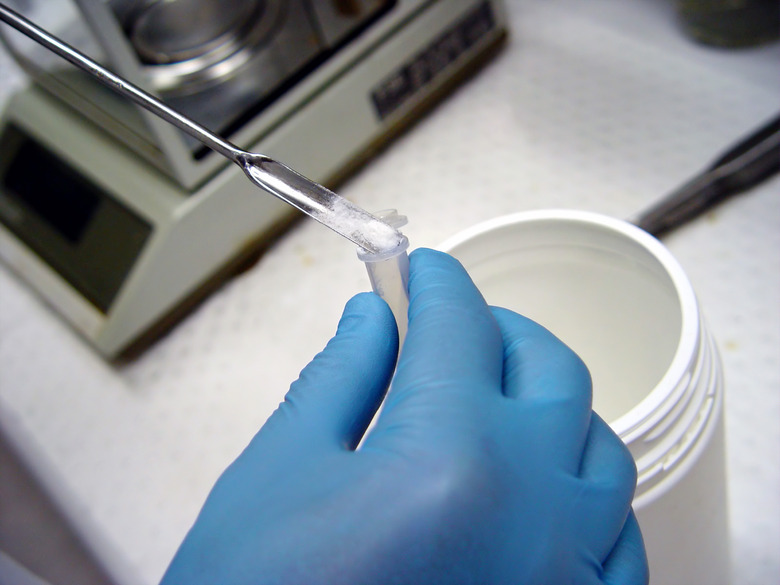How To Convert Amu To Kg
Individual atoms and molecules, the building blocks of matter, are too small to measure using macroscopic instruments or units, so scientists express mass using Atomic Mass Units, usually shortened to amu or AMU. In the real world, however, the use of atomic mass units would be impractical because of the bazillions of atoms and molecules that make up macroscopic quantities. Recognizing this, scientists defined the AMU in such a way as to make the conversion from microscopic to macroscopic quantities straightforward. The mass of an atom or molecule in AMU is equal to the mass of one mole of the atoms or molecules in grams. One gram is one one-thousandth of a kilogram.
TL;DR (Too Long; Didn't Read)
The mass of an element or molecule in atomic mass units is equal to the mass of a mole of the same particles in grams. Divide the number by 1,000 to get the molar mass in kilograms.
What Is a Mole?
What Is a Mole?
A mole is a very large number of atoms or molecules. This large number, known as Avogadro's number, is 6.02 × 1023. This number has been determined through a series of experiments conducted over a period of about 100 years by various researchers. A mole is to the macroscopic world what an individual particle is to the microscopic world with one difference: You can break a mole into fractions, but you can't do that to a particle such as an atom or molecule without changing it into something else.
A Mole of Hydrogen Gas
A Mole of Hydrogen Gas
The rule is that the mass of a particle in AMU is equal to the mass of a mole of the particles in grams. For example, the atomic mass of a hydrogen molecule (H2) is 2.016 AMU, so a mole of hydrogen gas weighs 2.016 grams. Since there are 1,000 grams in a kilogram, the mass of a mole of hydrogen gas is
\((2.016 ÷ 1,000) = 0.002016 = 2.016 × 10^{-3} \text{ kilograms}\)
You may have a quantity of particles that do not constitute a mole. For example, your sample of hydrogen gas may weigh only 2.52 × 10-4 kg. You can use the atomic mass of hydrogen, measured in AMU, to calculate the fraction of a mole of the gas in your sample. Just divide the mass of your sample, in kilograms, by the mass of one mole in kilograms. Since one mole of hydrogen gas has a mass of 2.016 × 10-3 kg, and you have 2.25 × 10-4 kg, you have only 1/8 of a mole.
Molar Mass of Compounds
Molar Mass of Compounds
To determine the mass of a compound, you count the atoms in the compound by looking at its chemical formula. Look up the masses of each of the atoms that constitute the molecule in the periodic table, add up these masses, and you'll have the mass of the molecule in AMU. This is also the mass of one mole of the compound in grams. If you want the molar mass in kilograms, divide by 1,000.
Examples
Examples
1\. What is the molar mass of calcium carbonate in kilograms?
The chemical formula of calcium carbonate in CaCO3. From the periodic table, you can determine the mass of calcium (Ca) to be 40.078 AMU, that of carbon (C) to be 12.011 AMU and that of oxygen (O) to be 15.999 AMU. Multiplying the mass of oxygen by 3 and adding to it the masses of carbon and calcium, you get the mass of the CaCO3 molecule, which is 100.086 AMU. This means that a mole of calcium carbonate has a mass of 100.086 grams, which is:
\((100.086 ÷ 1,000) = 0.100086 \text{ kilograms}\)
2\. How many moles are in a sample of aluminum weighing 5 kilograms?
The atomic weight of aluminum (Al) is 26.982 AMU, so a mole of the metal weighs 26.982 grams or 0.026982 kilograms. A sample weighing 5 kilograms contains
\((5 ÷ 0.026982) = 185.31 \text{ moles}\)
Cite This Article
MLA
Deziel, Chris. "How To Convert Amu To Kg" sciencing.com, https://www.sciencing.com/convert-amu-kg-6110127/. 2 November 2020.
APA
Deziel, Chris. (2020, November 2). How To Convert Amu To Kg. sciencing.com. Retrieved from https://www.sciencing.com/convert-amu-kg-6110127/
Chicago
Deziel, Chris. How To Convert Amu To Kg last modified March 24, 2022. https://www.sciencing.com/convert-amu-kg-6110127/
